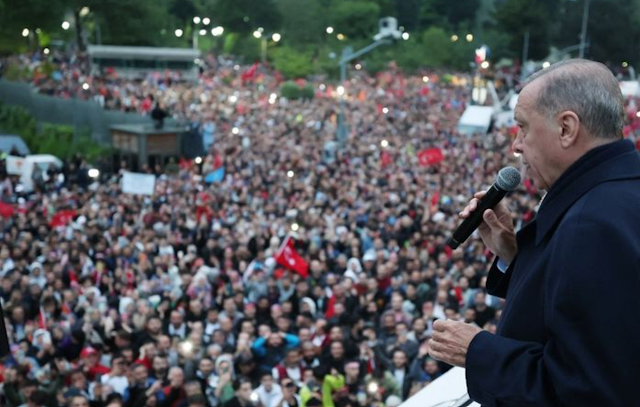Regeneration of Leadership in Turkey: Erdogan's Victory and Future Challenges
Introduction
In a surprising turn of events, Recep Tayyip Erdogan has emerged victorious in the second round of the presidential election in Turkey (28/5/2023). This victory comes as a contrast to the predictions made by several survey agencies, which anticipated Erdogan's defeat and the advantage of his opponent, Kemal Kilicdaroglu, in the first round. The results from the Supreme Election Council (YSK) show that Erdogan secured 52.14 percent of the votes, while Kemal closely trailed with 47.86 percent. In the first round, Erdogan only obtained 49.50 percent, while Kemal received 44.89 percent. The third candidate, Sinan Ogan (5.17 percent), and the fourth candidate, who withdrew from the race but still received 0.44 percent of the votes due to pre-printed ballots, played a minor role. In the second round, Ogan declared his support for Erdogan, but it turned out that his voters were divided between Erdogan and Kemal. These results reveal the intense competition in Turkey, where not only the political machinery is at work but also the charisma of the candidates and the support of influential figures, including foreign parties with their own interests. Several national issues have surfaced during the elections, which coincide with the significant moment of the signing of the Treaty of Lausanne on July 24, 1923, marking the international recognition of the Republic of Turkey led by Mustafa Kemal.
The Narrow Victory and the Challenges Ahead
Erdogan's narrow victory serves as a wake-up call for him and the People's Alliance (AKP, MHP, New Welfare, BBP), which also won the legislative elections (49 percent) on May 14 with a slim margin against the National Alliance (CHP, IYI Party, DEVA, Saadet, Democrat), which received 35 percent. The Labor and Freedom Alliance (11 percent), Founding Nation Alliance (2 percent), and Socialist Alliance (0 percent) also participated. When comparing the 2023 election results with the previous one in 2018, it is evident that the AKP's seats decreased from 295 (2018) to 267 (2023). In contrast, the opposition's seats (CHP) increased from 146 to 169. The Islamic forces were divided between the Yeniden Refah (5 seats) within the ruling camp and Saadet (10 seats) within the opposition camp. For foreign observers and the Western media, the AKP is perceived as an Islamic force that revives the values of the New Ottoman era. However, AKP leaders assert that they are themselves conservative democrats (especially in terms of social values) or passive secularists (to differentiate from the active secularist majority or Kemalism in Turkey). Looking at the balance of seats in the Turkish Parliament, the position of the AKP and Erdogan could be threatened if the MHP (50 seats) switches to the opposition. It is in this context that policy compromises are made between political parties.
The Maturity of Turkey's Political System
Turkey's democratic political system has matured over the years, allowing civilian forces to have relative sovereignty and keeping the military and economic oligarchy in check. The Turkish middle class is sizable and economically and politically independent, preventing polarization among the grassroots. The dynamics and domestic political turbulence do not significantly affect the national economic growth performance.
Since the implementation of the multi-party system in 1946 in Turkey, the AKP has been the only party to win six consecutive legislative elections, achieving a remarkable feat. However, Erdogan's victory in the recent elections highlights several challenges he and his party will face in the coming years.
Challenges Ahead for Erdogan and the AKP
1. Economic Stabilization: One of the pressing challenges for Erdogan is to stabilize the Turkish economy. The country has faced economic volatility, high inflation, and a depreciating currency in recent years. Erdogan will need to implement effective economic policies to address these issues and regain investor confidence.
2. Political Polarization: Turkey has been marked by political polarization in recent years, with deep divisions between Erdogan's supporters and his opponents. This polarization has strained social cohesion and hindered constructive political dialogue. Erdogan will need to work towards bridging these divisions and fostering a more inclusive political environment.
3. Rule of Law and Human Rights: Concerns have been raised about the state of the rule of law and human rights in Turkey under Erdogan's leadership. There have been criticisms regarding freedom of expression, media freedom, and the independence of the judiciary. Addressing these concerns and ensuring the protection of civil liberties will be crucial for Erdogan's government.
4. Foreign Relations: Turkey's foreign relations have faced challenges in recent years, including strained ties with some Western countries and regional conflicts. Erdogan will need to navigate these complex international relationships and work towards strengthening Turkey's position on the global stage.
5. Kurdish Issue: The Kurdish issue remains a longstanding challenge in Turkey. Finding a peaceful and lasting solution to the Kurdish question will require a balanced approach that addresses the legitimate concerns of the Kurdish population while preserving the unity and integrity of the country.
6. Demographic Changes: Turkey is experiencing significant demographic changes, with a young and increasingly urbanized population. Erdogan will need to address the evolving needs and aspirations of the youth and urban residents, ensuring inclusive policies that promote social mobility and economic opportunities.
7. Geopolitical Challenges: Turkey is situated in a complex geopolitical region, with conflicts and tensions in its neighborhood. Managing these challenges, including the situation in Syria, relations with Russia, and the evolving dynamics in the Eastern Mediterranean, will require diplomatic skill and strategic decision-making.
Conclusion
Recep Tayyip Erdogan's victory in the recent Turkish elections demonstrates the continued support he enjoys from a significant portion of the population. However, it also highlights the challenges that lie ahead for him and the AKP. Economic stabilization, political polarization, rule of law, foreign relations, the Kurdish issue, demographic changes, and geopolitical challenges will all require careful attention and effective policies. The coming years will be crucial in determining the trajectory of Turkey's leadership and its path forward.
